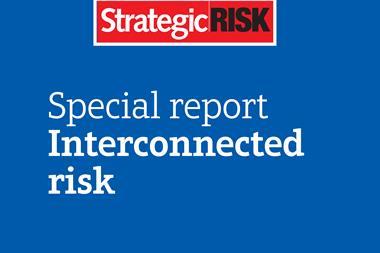Risk can be a good thing – business survive and thrive on good risk management. But the problem is, because we have all been misusing the word ‘risk’, its true meaning is now lost, writes Tony Thornton, ERM and business continuity expert
“He’s taking a big risk with that decision”- a commentator’s view on a football manager’s decision to put a particular player on the pitch.
“We’re just not prepared to take that risk”– an airport manager’s explanation as to why he had decided to ground all the aircraft.
“It’s too risky”– an interviewee’s personal view on a future investment in cyber-currency.
“I don’t want to risk it”– a colleague who turned down the offer of a curry on the evening prior to an interview
The trouble with trying to educate an organisation in the science and art of risk management is that the word ‘risk’ has become so misused in our everyday language, largely by people that have no formal training in risk management, that its meaning is being lost.
Risk cannot be ‘taken’, as in the first example above. ‘Decisions’ are taken, having (hopefully) gone to the effort of identifying and considering all the factors involved and making assessments about them. So, ‘taking a big risk’ with a ‘decision’ makes no sense, and yet it is common parlance – just watch the next footy match. My hunch is that the commentator meant to say;
“he’s accepted a situation where there is some probability of an undesirable event (unspecified) happening to that player which could (with a degree of uncertainty) affect his ability to play in future games, thereby reducing the team’s chances of progressing through to the next round”.
But that’s just not quite as snappy!
Similarly, as risk cannot be ‘taken’, we can be neither ‘prepared’ nor ‘unprepared’ for it. We can be prepared for a defined event, should it be realised; we buy snow shovels in case it snows, we carry umbrellas in case it rains, or we have a business continuity plan in place in case the office is inaccessible, etc, but we can’t prepare for a ‘risk’. My hunch here is that the airport manager should really be saying;
“After considering all the factors, I have made a decision to ground all the aircraft because there is a chance (unspecified) of a catastrophic event involving one of the aircraft (unspecified) after take-off, as a result of which there could be numerous fatalities, which would create tremendous suffering and grief to the families and I am not prepared for that. Besides, there’d be an enquiry…”
But that sounds nowhere near as gutsy!
Describing a future situation being ‘too risky’, I can only interpret that as meaning ‘too full of risk’. But we’re really no better off. Risk can be a good thing – business survive and thrive on good risk management. Particularly, investing in currencies (as in this case) always has risk attached to it – that’s why it’s done. So, to refer to a future investment as ‘too risky’ is meaningless. Perhaps the interviewee meant;
“I have read in the media and online about people’s experiences of investing in cyber currency and suffering massive loss or losing their investments altogether because of trading companies going bust. All things considered, I’m far more comfortable keeping my sterling”
But again – it just sounds nerdy!
As for my colleague and his interview, we’ll leave that there…
The point is that ‘risk’, ‘taking risk’, things being ‘too risky’, etc does not make sense on close examination, and part of the challenge for risk managers is to break down pre-conceived ideas of what risk is…
…or come up with a different name for ‘The Uncertainty Surrounding the Probability and Outcomes of Events’.
TUSPOEs?




















No comments yet